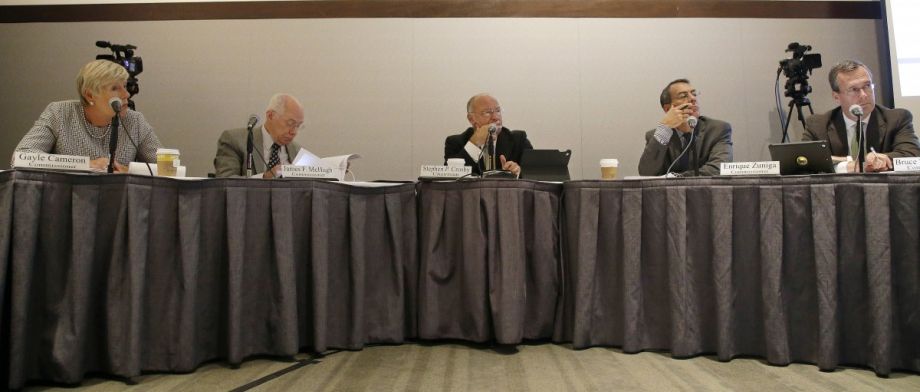Despite little evidence to support casinos’ ties to significant economic growth (and studies that show such venues can be harmful to a neighborhood), cities and states across the U.S. continue to hear the siren song of gambling moguls. But this week’s casino news shows how urban officials are increasingly taking a more nuanced view of gambling.
Georgia Considers Casinos for Atlanta and Beyond
Lawmakers in Georgia are deciding on an amendment that would allow voters to choose whether or not casinos have a place in the Peach State. House Resolution 807 would allow six casinos in the five licensing regions throughout the state. According to Georgia’s WMAZ, the region that includes Atlanta and Fulton County could have two casinos.
The resolution would first need to pass with a two-thirds majority in the House and Senate, but so far, lawmakers seem torn. Some supporters, like Rep. Nikki Randall, a Macon Democrat, are making the argument that it will keep money in the state that would otherwise be spent elsewhere.
“In my district alone, several buses leave here and go to Alabama and to Florida and Mississippi to visit casinos two or three times a month,” Randall said.
Skeptics and those on the fence are curious about where the money from the casinos would go. Some think it’s up to Georgia voters to decide. At any rate, lawmakers still have some time to mull things over. The 2016 legislative session for the General Assembly convenes January 11th.
Economic Adviser Tells Atlantic City to Think Entrepreneurship
In Atlantic City, where dependence on a gambling economy has led to a long, slow decline, officials continue to look for a turnaround solution. The Press of Atlantic City reported this week on a call from AngelouEconomics (economic consultants to the city) for the private sector to take action.
“This is going to have to be private-sector led and funded, with some support from the public as well,” Angelos Angelou said. “Economic development is done best by local businesses, not in the hands of the state.”
Angelou, whose firm has worked with many cities, pointed to Atlantic City’s unique problem, that it has too long been completely reliant on casinos: “There has been no discernible industrial cluster here to build on.”
Angelou argues that in times of economic distress, it’s best to focus on entrepreneurship. He’s advocating for the creation of a nonprofit Atlantic County Economic Development Corp. to implement a strategy.
Another vision for Atlantic City’s future was also recently floated: Daniel Windsor, a senior urban designer at Perkins+Will, proposes that A.C. repurpose sprawling casinos as research labs and spaces that could support the tech industry. He thinks that Atlantic City is uniquely positioned to become an innovation hub with a primary focus on combating the negative effects of climate change given its seaside locale.
“We saw a need not only due to its vulnerability to storms such as Sandy,” Windsor told Curbed, “but also due to the failing, gambling-based economy. We could find a new niche, a new economic catalyst and reposition the entire city.”
Boston Region Hopeless for Casinos?
Though Massachusetts voters have ruled in favor of allowing casinos in the state, rollout is proving to be tricky for industry developers. Last week, the much-hyped plan for a New Bedford casino collapsed. Lack of funding and confidence in its future were the final nails in the coffin for the $650 million proposal.
One thing keeping investors wary: In an attempt to ensure that casinos do in fact deliver the jobs and economic growth promised by the industry, the Massachusetts law requires that casinos receive a minimum of $500 million in investments. That’s a tall order for developers and a big risk for investors.
Steve Wynn, chief executive of Wynn Resorts, has complained that while Massachusetts residents voted to let casinos into the state, they have yet to roll out the welcome wagon. Wynn is behind the $1.7 billion proposal for a casino in Everett that was originally planned for East Boston — where the community rejected it.
“We’re hopeful that in Massachusetts at some point in the near future, we’ll be treated with a little softer hand considering that we’re the largest single private investment in the history of the state, and that we’re bringing to that town non-casino attractions that have never been around,” Wynn said on a call with investors.
According to the Boston Globe, the no-go on New Bedford:
… is a market signal that the gaming commission can’t just ignore. A failing casino would be a huge headache for the Commonwealth. …
Jenn Stanley is a freelance journalist, essayist and independent producer living in Chicago. She has an M.S. from the Medill School of Journalism at Northwestern University.
Follow Jenn .(JavaScript must be enabled to view this email address)








